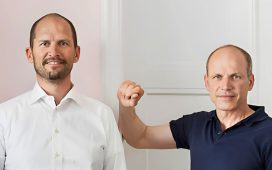Los Angeles County startups have borne the blows of the economic downturn, but they’ve been faring better – and regaining strength faster – than the nation on average. But the road to recovery will be a long one, experts say, and will prove particularly difficult for late-stage companies.
That’s bad news in the short term for most of these companies, but it could actually work in the favor for a few of them in the long term, according to Paul Bricault, founder and managing partner of the early-stage venture capital fund and startup accelerator Amplify.LA., based out of Venice.
“The market currently is in slow recovery from the downturn that really started in the first quarter of last year, where there was a significant decline in investment activity after the incredible year that was 2021,” said Bricault, noting a 75% decline in investment activity between the fourth quarter of 2021 and the second quarter of 2022. “The downturn really hurt the late-stage companies first, and the ball kept rolling down the hill from there.”
Start-ups at the Series D stage were affected immediately by the downturn, said Bricault, who also serves as a venture partner at the New York-based Greycroft Partners. Earlier stage start-ups were largely unaffected initially, but the continued lack of liquidity eventually caught up to them.
“It trickled down to Series B, and then to seed and pre-seed, both in terms of the cadence of the deals and the number of deals getting done,” said Bricault. “That in turn had an effect on the pre-money valuation of the deals. They weren’t seeing triple digit declines like late-stage companies, it was more like a 30 to 40% for early stages, but it was significant.”
Early money available
Fortunately, it appears investment activity may have hit a bottom in the early months of this year and has begun tracking upward. PitchBook, a private equity activity researcher, reported in November that while overall venture capital valuations continued to descend in the third quarter, seed stage companies have “experienced a modest ascent” over the second quarter.
That’s good news for Bricault’s Venice-based Amplify.LA, which focuses on early-stage start-ups.
“Our deal cadence has not diminished that much because of the stage we’re focusing on. I’ve also been around long enough to know that these moments post-reset are some of the best times to invest,” said Bricault. “There’s less competition, and there’s inevitably going to be companies that emerge from this much stronger than they would have been once they’ve weathered the storm, manage the burn, and come out the other side.”
Arlan Hamilton, founder and managing partner of West Hollywood-based venture capital firm Backstage Capital, sees similar opportunities for startups emerging from the market turmoil.
“Over the past year or two, the startup investment landscape has definitely evolved. Despite the global downturn in venture funding, Backstage has remained steadfast in our commitment to discovering and supporting underestimated founders,” said Hamilton. “Our strategy remains to be discerning with investments, focusing on startups with sustainable growth plans and clear paths to profitability.”
Backstage Capital focuses its investments on companies owned and operated by women, people of color, LGBTQ+ and other underrepresented groups. Though Backstage Capital has felt the impact of the recent economic downturn like most companies, Hamilton said, it’s no stranger to adversity.
“The reality is that women, POC, and LGBT-run companies have always faced limited access to traditional funding sources. While they might be more adversely affected by funding downturns, we’ve also observed a unique resilience and adaptability in these companies,” Hamilton said. “The startups we invest in often begin with leaner resources and a heightened awareness of market realities, traits that can actually be advantageous in tougher economic times.”
Strong recovery
Hamilton said that Southern California’s diverse economy remains fertile ground for innovation, particularly in industries like digital health, clean technology and entertainment technology.
“L.A.’s unique blend of tech, creativity and entrepreneurship aligns well with Backstage Capital’s investment ethos,” said Hamilton.
Backstage has invested in a number of locally headquartered startups, including Santa Monica-based CloudNine AI, a company that Hamilton said is “revolutionizing automated data management systems using AI.” Other local portfolio companies include downtown-based beauty products retailer AMP Beauty LA and animation software developer UNOMi, based in Venice.
“Each of these companies not only embodies technological innovation, but also reflects our commitment to supporting diverse founders and ideas that have the potential to reshape industries,” Hamilton said.
While start-ups with unrepresented leadership are showing impressive resiliency in the downturn, Hamilton said Los Angeles County businesses have fared well on the whole.
A May report from the equity data researcher Carta found that Southern California investment activity was weathering the market chaos better than most other counties.
Investment activity in San Francisco declined 59.5% between the start of the fourth quarter last year and first quarter of this year, in line with the 60% national average, while Los Angeles County investment only declined 39% over the same period.
Bricault said that’s likely due in no small part to the variety of Southern California’s industries, from companies investing in cutting edge technologies such as AI and alternative energies to old reliables like transportation and entertainment. Bricault said Amplify.LA is investing heavily in manufacturing and automation companies and is increasingly focused on AI-enabled businesses. About 50% of the company’s investments are based in Southern California, Bricault said.
“L.A. has dramatically widened the breadth of companies that are successfully building their business here, and the tech ecosystem has become much more robust in terms of the number of verticals that have been grown up here,” Bricault said.











